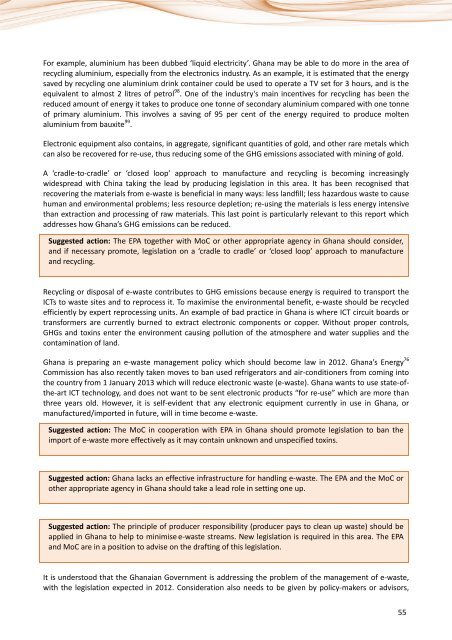Information and communication technologies (ICTs) and ... - ITU
Information and communication technologies (ICTs) and ... - ITU
Information and communication technologies (ICTs) and ... - ITU
Create successful ePaper yourself
Turn your PDF publications into a flip-book with our unique Google optimized e-Paper software.
For example, aluminium has been dubbed ‘liquid electricity’. Ghana may be able to do more in the area of<br />
recycling aluminium, especially from the electronics industry. As an example, it is estimated that the energy<br />
saved by recycling one aluminium drink container could be used to operate a TV set for 3 hours, <strong>and</strong> is the<br />
equivalent to almost 2 litres of petrol 98 . One of the industry's main incentives for recycling has been the<br />
reduced amount of energy it takes to produce one tonne of secondary aluminium compared with one tonne<br />
of primary aluminium. This involves a saving of 95 per cent of the energy required to produce molten<br />
aluminium from bauxite 99 .<br />
Electronic equipment also contains, in aggregate, significant quantities of gold, <strong>and</strong> other rare metals which<br />
can also be recovered for re-use, thus reducing some of the GHG emissions associated with mining of gold.<br />
A ‘cradle-to-cradle’ or ‘closed loop’ approach to manufacture <strong>and</strong> recycling is becoming increasingly<br />
widespread with China taking the lead by producing legislation in this area. It has been recognised that<br />
recovering the materials from e-waste is beneficial in many ways: less l<strong>and</strong>fill; less hazardous waste to cause<br />
human <strong>and</strong> environmental problems; less resource depletion; re-using the materials is less energy intensive<br />
than extraction <strong>and</strong> processing of raw materials. This last point is particularly relevant to this report which<br />
addresses how Ghana’s GHG emissions can be reduced.<br />
Suggested action: The EPA together with MoC or other appropriate agency in Ghana should consider,<br />
<strong>and</strong> if necessary promote, legislation on a ‘cradle to cradle’ or ‘closed loop’ approach to manufacture<br />
<strong>and</strong> recycling.<br />
Recycling or disposal of e-waste contributes to GHG emissions because energy is required to transport the<br />
<strong>ICTs</strong> to waste sites <strong>and</strong> to reprocess it. To maximise the environmental benefit, e-waste should be recycled<br />
efficiently by expert reprocessing units. An example of bad practice in Ghana is where ICT circuit boards or<br />
transformers are currently burned to extract electronic components or copper. Without proper controls,<br />
GHGs <strong>and</strong> toxins enter the environment causing pollution of the atmosphere <strong>and</strong> water supplies <strong>and</strong> the<br />
contamination of l<strong>and</strong>.<br />
Ghana is preparing an e-waste management policy which should become law in 2012. Ghana’s Energy 76<br />
Commission has also recently taken moves to ban used refrigerators <strong>and</strong> air-conditioners from coming into<br />
the country from 1 January 2013 which will reduce electronic waste (e-waste). Ghana wants to use state-ofthe-art<br />
ICT technology, <strong>and</strong> does not want to be sent electronic products “for re-use” which are more than<br />
three years old. However, it is self-evident that any electronic equipment currently in use in Ghana, or<br />
manufactured/imported in future, will in time become e-waste.<br />
Suggested action: The MoC in cooperation with EPA in Ghana should promote legislation to ban the<br />
import of e-waste more effectively as it may contain unknown <strong>and</strong> unspecified toxins.<br />
Suggested action: Ghana lacks an effective infrastructure for h<strong>and</strong>ling e-waste. The EPA <strong>and</strong> the MoC or<br />
other appropriate agency in Ghana should take a lead role in setting one up.<br />
Suggested action: The principle of producer responsibility (producer pays to clean up waste) should be<br />
applied in Ghana to help to minimise e-waste streams. New legislation is required in this area. The EPA<br />
<strong>and</strong> MoC are in a position to advise on the drafting of this legislation.<br />
It is understood that the Ghanaian Government is addressing the problem of the management of e-waste,<br />
with the legislation expected in 2012. Consideration also needs to be given by policy-makers or advisors,<br />
55

















